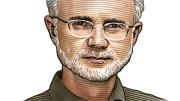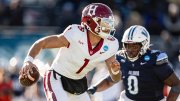When I’m asked as a composer to make a prediction of what music will be like in 50 or a hundred years, I respond by saying I can no more imagine what that music will sound like than Brahms could have predicted the electric guitar. But the allure of peering into the future is always hard to resist.
I have two images of what Harvard might be like in 2036, one utopian and the other dystopian. My dystopian anxiety is simply that Harvard, despite its best efforts, will be forced to mirror our current national slouching toward total plutocracy, toward a new Gilded Age of unimaginable disparities between a small privileged power elite and an unhappy majority—the poorly educated, the underpaid, and the easily manipulated—people whose lives will grow increasingly colorless and drab, designed and dictated as they are by inviolable corporate interests.
What 18-year-old student in the year 2036 will be able to graduate from a public high school (if such an institution even exists) with enough preparation to survive the competition of classmates whose wealth, upbringing, educational privilege, and social self-esteem would positively crush him or her? Will Harvard, simply to survive, join in this hectic embrace of social Darwinism that the country seems locked into?
In my utopian version I see a university whose demographics reflect the rich variety of American society, one that would never make financial circumstances an issue in choosing its students—in other words, one that could identify a teenage Barack Obama and make it possible for him to attend and flourish. I also imagine a Harvard that treats the arts with the same sense of importance that it accords its schools of law, medicine, science, and business.
For too long Harvard has viewed the arts as an ancillary activity, as extracurricular, something its students do on the side. It is a time-honored attitude and in part well founded: Harvard students, being exceptionally motivated and endlessly creative, are best left to initiate their own artistic endeavors. There is value to this philosophy, but its downside is that Harvard remains, artistically, a place that celebrates a kind of highbrow amateurism. Every once in a while a Yo-Yo Ma ’76, D.Mus. ’91, a Leonard Bernstein ’39, D.Mus. ’67, a Philip Johnson ’27, B.Arch. ’43, or a Natalie Portman ’03 will emerge to prove that you can go to Harvard, be brainy, and still emerge with serious professional chops. And having a future Fortune 500 executive acting in an Adams House Oedipus or playing oboe in the Bach Society Orchestra is good for the future of charitable giving to the arts. No question about it.
But the arts at Harvard ought to be world-class, a place where great art is not merely studied and analyzed while students are left to their own devices when it comes to making it. So on my good days I imagine the Harvard of 2036 a beehive of creative activity, a place where painters and dancers and cellists and poets and filmmakers learn their craft from the great masters in their fields and where stimulation and invention (and, well, yes, odd behavior) are the norm. Is there any reason not to think Harvard capable of that?
Composer, conductor, and author John Adams ’69, A.M.’72, won the 2003 Pulitzer Prize in Music for his On the Transmigration of Souls, commissioned by the New York Philharmonic, and earlier this year conducted his opera Nixon in China at the Metropolitan Opera.









